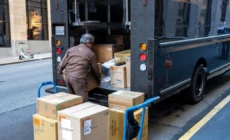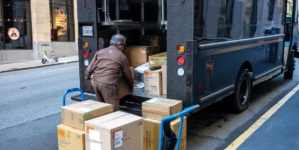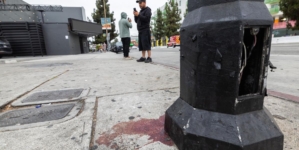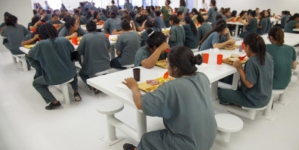-
Aaron Boone’s ‘Laissez-Faire Attitude’ Ripped After Yankees’ Humiliating Sweep - 13 mins ago
-
Travel influencers boost tourism to Taliban-run Afghanistan - 26 mins ago
-
Orbán: If you have no persuasive power, then you have no victory either - 29 mins ago
-
First-time candidate Cloobeck spends big on TV ads in governor’s race - 37 mins ago
-
Josh Jung crushes walk-off three-run homer in Rangers' 8-5 win over Yankees - 46 mins ago
-
Patriots Coach Suffers Major Health Scare During Monday’s Practice - 52 mins ago
-
It’s tarantula mating season. Where you can spot the spider and how to avoid getting bit - about 1 hour ago
-
2025 FedEx St. Jude Championship Odds: Scottie Scheffler Heavily Favored - about 1 hour ago
-
NFL Analyst Bashes Jerry Jones’ Approach With Micah Parsons - 2 hours ago
-
UPS to pay nearly $2 million to settle lawsuit over hazardous waste sent to local landfills - 2 hours ago
California cannabis firm raided by ICE unveils big labor changes
One of California’s largest legal cannabis companies announced Monday that it would radically revamp its labor practices in the wake of a massive immigration raid at two company facilities last month. The raid led to the death of one worker and the detention of more than 360 people, including, according to government officials, 14 minors.
Glass House Brands announced it had “terminated its relationship” with the two farm labor contractors who had provided workers to the cannabis green house operations in Camarillo and Carpinteria. It also announced that it has “made significant changes to labor practices that are above and beyond legal requirements.”
Those include hiring experts to scrutinize workers’ documents as well as hiring the consulting firm Guidepost Services to advise the company on best practices for determining employment eligibility. The firm is led by Julie Myers Wood, a former ICE director under President George W. Bush.
The company also said it has signed a new “labor peace” agreement with the International Brotherhood of the Teamsters.
Glass House officials declined to comment publicly beyond what was in a press release, but a source close to the company said that officials wanted to “make sure we never have a situation that we had on July 10. We can’t have this ever happen again.”
On that day, federal agents in masks and riot gear stormed across Glass House operations in Ventura and Santa Barbara county in the state’s largest ICE workplace raid in recent memory. Agents chased panicked workers through vast green houses and deployed tear gas and less-than-lethal projectiles at protesters and employees.
One worker, Jaime Alanis Garcia, died after he fell three stories from the roof of a greenhouse trying to evade capture. Others were bloodied from shards of glass broken or hid for hours on the roofs or beneath the leaves and plastic shrouding. More than 360 people — a mixture of workers, family members of workers, protesters and passerby—were ultimately detained, including at least two American citizens including a U.S. Army veteran.
In the wake of the raid, Homeland Security Secretary Kristi Noem said that Glass House had been targeted because “we knew, specifically from casework we had built for weeks and weeks and weeks, that there was children there that could be trafficked, being exploited, that there was individuals there involved in criminal activity.”
To date, neither Homeland Security nor the U.S. Department of Justice have announced any legal action regardlng the alleged trafficking and exploitation of juveniles.
In its press release, Glass House said that just nine of its direct employees were detained; all others picked up were either employees of its labor contractors or were “unassociated with the company.”
With regards to the government’s contention that it had found children working in cannabis, the company said: “while the identities of the alleged minors have not been disclosed, the company has been able to determine that, if those reports are true, none of them were Glass House employees.” California labor law allows children as young as 12 to work in agriculture, but workers must be 21 to work in cannabis.
The raid devastated Glass House and its workforce. Numerous workers were detained or disappeared, terrified to return. Those that remained were so distraught the company called in grief counselors.
Across the wider world of legal cannabis, people were also shaken. Glass House, which is backed by wealthy investors and presents a sleek corporate image in the wild world of cannabis in California, has long been known as the “Walmart of Weed.” Many in California’s cannabis industry feared the raid on Glass House was a signal that the federal government’s ceasefire against cannabis —which is legal in California but still not federally—had come to an end.
In the wake of the raid, the United Farm Workers and other organizations warned farm laborers who were not citizens — even those with legal status — to avoid working in cannabis because “cannabis remains criminalized under federal law.”
In its statement, Glass House said the search warrant served on the company the day of the raid was seeking “evidence of possible immigration violations.” A source close to the company said officials have had no further contact with the federal government since the raid.
Some farm labor advocates were unimpressed by the company’s announcement of revamped labor practices, saying it was farm workers who would pay the price.
Lucas Zucker, co-executive director of Central Coast Alliance United for a Sustainable Economy, or CAUSE, said Glass House was using farm labor contractors to avoid responsibility “while their workers are torn away from their families in handcuffs.”
“This shows the double standards of our legal system, where corporations can profit from the immigrant workers their businesses depend on, yet wipe their hands clean when it becomes inconvenient,” he said. He added that “many farmworkers are still struggling to navigate this mess of labor contractors and have not been paid for the work they did at Glass House.”
A source close to Glass House said company officials want to make sure everyone who was at work on the day of the raid receives all the wages they are owed.
Company officials authorized all workers to be paid through 11:30 pm on the day of the raid, because workers who had finished their shifts couldn’t get out because immigration agents were blocking the doors. The source said the farm labor contractors had been paid and should have released wages to all the workers.
“We don’t want anyone to be shorted,” the source said.
Source link































